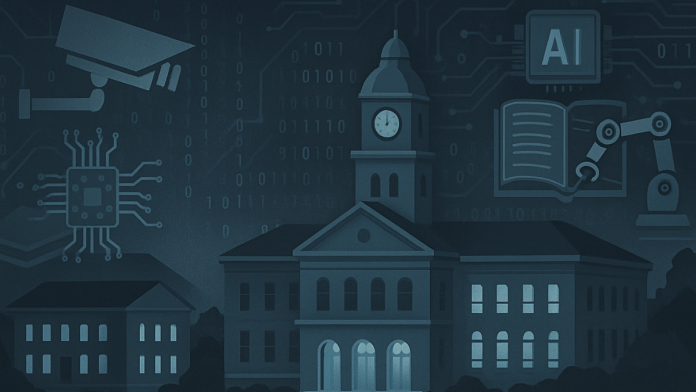Concerns about foreign interference in American universities are gaining attention after two Stanford student journalists exposed alleged acts of China espionage on campus.
Elsa Johnson and Garret Molloy say the Chinese Communist Party (CCP) is pressuring students and collecting sensitive research through intimidation and secret agreements. Their findings, published in The Stanford Review, have raised questions about academic freedom, national security, and the safety of international students studying in the U.S.
Students Uncover Secret Pressure on Campus
Johnson and Molloy’s investigation began with an unsettling message on Instagram. Johnson was contacted by someone using the name “Charles Chen,” who urged her to visit China without a visa. She found the situation strange and reported it to the FBI. What followed, she said, was a deeper discovery: other students and faculty had faced similar attempts at coercion and manipulation.
They uncovered anonymous testimonies revealing that some Chinese students at Stanford were being monitored and pressured by their home government. Many are working in labs tied to artificial intelligence, robotics, and other advanced technologies.
The journalists explained that under China’s 2017 national security law, citizens can be required to provide information to the government — even while living abroad. With more than 1,100 Chinese nationals enrolled at Stanford, the concern is that the Chinese state has a direct channel to valuable research.
China accused of weaponizing students to police UK university discussions
Loyalty Pledges, Threats, and Fear
A significant portion of Chinese students in the U.S. receive funding from the China Scholarship Council (CSC). Johnson and Molloy reported that those who accept CSC funds must sign pledges of loyalty to the CCP. These pledges can include agreeing to report information back to government officials.
Molloy shared that in some cases, when students refuse to cooperate, their families back in China are threatened. This has created an environment of fear and silence, even at a university known for free expression and innovation.
Johnson, who studied China at Stanford’s Hoover Institution, said she has been unfairly labeled a racist for reporting the story. She strongly denied this and explained her real concern is for the freedom and safety of Chinese students who came to the U.S. to study and grow — but instead live under invisible pressure.
The two student reporters said their goal is to protect these students from being used as tools of foreign intelligence. They believe no one should be forced to choose between their education and their family’s safety.
National Experts Confirm Growing Threat
Shortly after the article’s release, the Heritage Foundation hosted a panel titled “How to Stop ‘Academic Espionage’ on Campus.” Johnson and Molloy spoke at the event alongside experts including Jonathan Butcher, Jay Greene, Paul Moore, and Simon Hankinson.
Trump’s 50% tariffs backfire? Modi reaches toward China with surprise SCO return after 7 years
Greene, a senior fellow in education policy, said that with over one million international students in the U.S., including many at elite schools, thorough screening is essential. He added that in large numbers, even a small percentage of students acting under foreign influence can pose major risks.
Moore, assistant general counsel at the U.S. Department of Education, reminded the audience that federal funding supports over $55 billion in research at American universities. He emphasized that protecting this investment is a national concern.
The panel also referenced the case of Charles Lieber, a former Harvard professor who was convicted of hiding his financial ties to Chinese institutions. He was paid in cash and held a role at the Wuhan Institute of Technology — a case seen by many as proof that espionage in academia is real.
Hankinson, a former State Department official, stated that nearly 2,000 student visas have already been revoked in recent years, mostly for rule violations or security concerns. He explained that while the U.S. is generous with visa programs, it must ensure students come to study — not spy.
Other examples included pro-Palestinian campus protests allegedly led by long-term foreign students, such as Columbia’s Mohsen Mahdawi, who remained an undergraduate for 17 years and was recently arrested by immigration officers.
While reactions to the report vary, the concern is clear: the quiet pressure facing international students may be affecting not just personal freedom, but the security of the U.S. research system itself.


